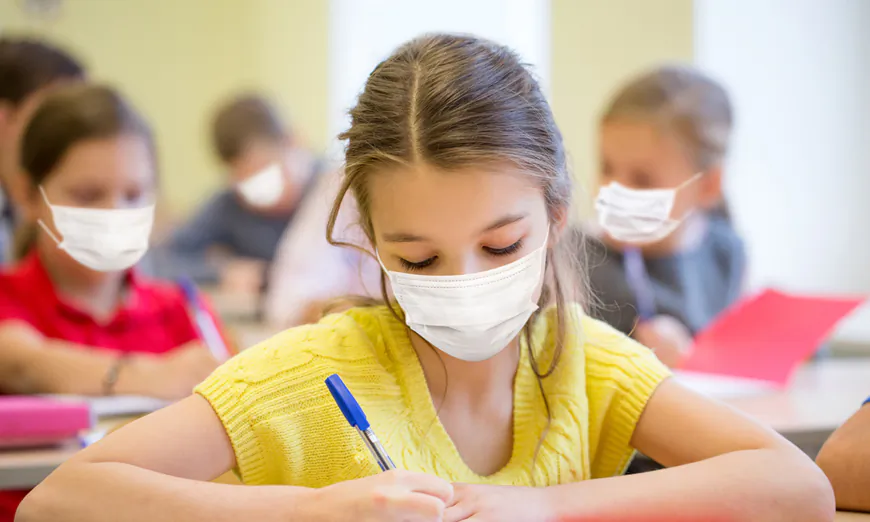You must understand that all the mask data was worked over after the 1918 pandemic, one hundred years ago. We knew this before the so called pandemic was declared.
so here we are discovering that the science was right. how disgusting.
I came to the conclusion early on that the medical events been experienced were from a weaponized common cold virus. So far nothing has changed my mind. The real damage comes from the JAB of which I suspect a third werre placebo allowing selection and that five percent were deadly. The rsst could be a weraponized AIDs virus.
Now amusing at all..
Reanalysis of Highly Influential Mask Study Shows Universal School Masking Did Not Lead to Fewer COVID-19 Cases
Jul 28 2023
https://www.theepochtimes.com/health/reanalysis-of-highly-influential-mask-study-shows-universal-school-masking-did-not-lead-to-fewer-covid-19-cases-5428435
Whether masking requirements effectively prevented COVID-19 in schools and should be used as a mitigation strategy for future outbreaks is a highly contested issue, with children as young as two years old expected to mask up during the worst restrictions.
A reanalysis of a highly influential Boston mask study claiming continued mask mandates reduced COVID-19 cases in schools found districts that dropped masking requirements actually experienced the largest decreases in COVID-19 cases—and failed to identify any causal relationship between mask mandates and infection rates.
In a recently published preprint in arXiv, researchers reanalyzed data published in the New England Journal of Medicine (NEJM) from the Massachusetts Department of Elementary and Secondary Education and the Centers for Disease Control and Prevention to compare COVID-19 incidence in school districts that did and did not lift mask mandates.
The original NEJM study claimed lifting the statewide masking policy among school districts in the greater Boston area resulted in an additional 44.9 COVID-19 cases per 1,000 students and staff during the 15 weeks after the policy was rescinded, corresponding to an estimated 12,000 additional COVID-19 cases and to 29 percent of all cases in the school district.
Although an observational study should not be used to identify causal effects with confidence, the authors nevertheless concluded that masking requirements prevented COVID-19 cases, then used the results to justify policy decisions.
“Our results support universal masking as an important strategy for reducing Covid-19 incidence in schools and loss of in-person school days,” wrote the authors, who included researchers from Harvard University and the Boston Public Health Commission.
Furthermore, the authors encouraged school districts to use the study’s findings to “develop equitable mitigation plans in anticipation of a potential winter Covid-19 wave during the 2022–2023 school year, as well as clear decision thresholds for removing masks as the wave abates.”
After reanalyzing the same data using multiple methodologies, including utilizing a larger statewide control group, researchers came to a strikingly different conclusion: Schools that dropped masking requirements experienced a 22 percent decrease in COVID-19 cases compared to a 12 percent decrease in masked districts.
Additionally, slightly higher case rates were observed in masked districts, and a “moderate to strong relationship” was found between natural immunity and case rates during the original study.
The researchers used data from the 72 school districts included in the original study and broadened their analysis to include 289 districts across Massachusetts to account for confounding variables—additional variables that weren’t considered in the original study that could influence the outcome.
Only two school districts, Boston and Chelsea, kept mask mandates in place. Five to seven districts had sporadic masking rules, and most of the 289 districts did not.
Researchers found that prior SARS-CoV-2 infection rates were highest in the Boston-Chelsea school districts requiring masks, which could account for any decrease in COVID-19 cases compared to the other 70 school districts analyzed by both studies.
In a statement regarding the recently published preprint, epidemiologist and co-author Dr. Tracy Høeg said the causal inference drawn by the original paper that wearing masks prevented additional COVID-19 cases was inappropriate given the data they had. She and her colleagues showed districts that dropped masks first had the most significant decrease in cases, and as many as two-thirds of the variation in case rates could be attributed to natural immunity, not masks.
Reanalysis Shows Study Used Flawed Methodology
The authors of the preprint also called into question the initial study’s methodology, which they argue was inappropriate to use because it wasn’t applied correctly and failed to account for additional interventions likely used by school districts imposing mask mandates, including physical distancing, staggered mealtimes, and ventilation upgrades.
The original study’s authors restricted their analysis to 72 districts without providing justification for limiting their data by excluding several districts outside the Greater Boston area that are geographically closer to Boston than other included districts.
Their results were not robust in length and failed to account for natural immunity. They only included data from 15 weeks, whereas the reanalysis expanded the period to account for case rates during the entire academic year before and after mask requirements were lifted.
According to a Harvard press release, the authors of the original study claimed their findings showed the effect of school masking policies were greatest when COVID-19 incidence was highest in surrounding cities and towns, suggesting universal masking policies would be most effective during times of high transmission.
The authors of the reanalysis pointed out that Boston-Chelsea was found to have the lowest case rates throughout the entire academic year because it was initially “hit the hardest by COVID-19” and wouldn’t be expected to have high case rates given the districts were more likely to be protected from reinfection by natural immunity.
For multiple reasons, the results of the NEJM study do not hold up to reanalysis, the authors stated.
“We failed to identify evidence of a causal relationship, or even consistent association, between mask mandates and district SARS-CoV-2 infection rates,” and the NEJM study “should not be used as evidence mask mandates prevent the spread of SARS-CoV-2 in educational settings.”

No comments:
Post a Comment